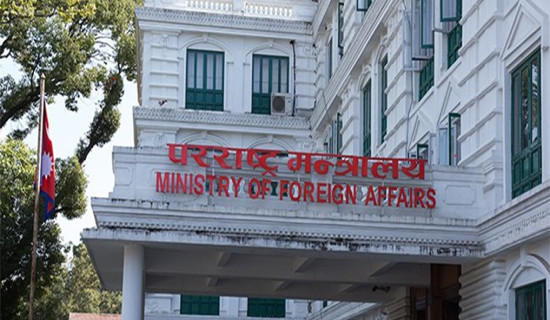- Wednesday, 4 March 2026
Mediation Key To Break Political Logjam
Nepal undergoes the recurring cycle of the political conflicts time and again. This time Nepali Congress is building pressure and hurling barbs against Rastriya Swatantra Party (RSP) leaders especially the incumbent deputy and home minister Rabi Lamichhane, seeking the latter’s resignation and formation of the panel to probe into his alleged involvement in the so-called cooperative scam. As of now, both sides seem to be hardening their posturing against each other. Such type of positional conflict leads to a long-drawn-out political stalemate, seriously causing the political and social consequences for the country. In order to resolve such protracted positional conflicts, political mediation could be a preferable option.
But resort of mediation to address political conflicts has not been practiced not only in Nepal but also in other South Asian countries as well. While civil and commercial mediation have been widely practiced and legalised, its use to settle conflicts of political realm has been less thought about. Political mediation can take many forms, ranging from informal dialogue between conflicting parties to more formalised and structured mediation processes. It is applied when other negotiation methods have been ineffective, and the situation has intensified to a point where the involved parties cannot arrive at a solution on their own.
Peaceful resolution
The main objective of political mediation is to promote a peaceful resolution that addresses the causes of the conflict, and encourages peaceful relationship and collaboration among the political stakeholders. It is a method used to settle conflicts where a neutral third party facilitates dialogue between the estranged parties. The ultimate aim of political mediation is to find a resolution to the conflict that is acceptable to all involved parties while preventing conflict escalation. It enables the parties involved to discuss the core issues causing the conflict rather than just treating the surface-level symptoms. By delving deeper into the underlying causes of the conflict, political mediation can facilitate finding a lasting resolution that satisfies all parties involved.
Acknowledging the shared challenges opens the door to cooperation between conflicting parties. In fact, making progress towards a fairer and just society demands collaboration among political parties, aligned objectives, and the pooling of resources, knowledge, and expertise to create a long-lasting impact. In addition, political mediation can also address the root causes of all types of conflicts, including structural inequalities, discrimination, and exclusion.
In many western countries like Germany political mediation has been widely used to overcome legislative stalemates. At the heart of the German political system lies the Bundestag (lower chamber of Parliament) and the Bundesrat (upper chamber of the parliament representing the 16 federal states) which together form the German parliament. When these two disagree on legislation, the mediation committee which is known as Vermit can step into the breach. The Mediation Committee, comprising members from both houses, isn't concerned with drafting new laws or arguing for or against amendments, but is about finding common ground.
Just like in interpersonal mediation, according to mediation related educational resources shared by Mediator Academy, headed by Aled Davies, all meetings of the mediation committee are held in private. This modus operandi is not without its critics - as all discussions and negotiations are held out of the public eye. Concerns have, therefore, been raised about the transparency, and the fact that this might undermine the democratic principle of open debate and deliberation. The mediation committee of the German parliament has been in the news recently as it looked likely that it would take on the task of mediating on aspects of Germany’s controversial new legislation proposing to legalise cannabis.
After fiery public consultations, the draft legislation was published in late 2023 and became the subject of intense debates in the Bundestag. Various state-level justice and health departments wanted to review aspects of the legislation, which would impact a whole lot of other state legislation. The Bundesrat’s Legal and Health Committee, therefore, made a list of potential areas to be addressed in mediation. This plan was generally welcomed as, with the coalition parties themselves in disagreement over the legislation too, this would have been a prime opportunity for mediation. Finally, as agreed and decided, the legislation has started partially to enter into force on first April 2024.
While we normally only associate mediation in political contexts with peace-making, such as the recent efforts of Qatar in the Middle East, Germany’s "mediation as legislative deadlock-breaker” approach is not as uncommon as one would think. As mentioned in the Mediator Academy sources, the United States Conference Committee, which is formed when the House of Representatives and the Senate pass different versions of the same bill. The Committee acts as a mediator to reconcile the differences between the two versions of the legislation. The agreed-upon bill is then sent back to both chambers for a final vote.
Flexibility
In South Africa, the National Economic Development and Labour Council serves as a formalised platform for the government, businesses, labour unions, and community groups to discuss and negotiate on economic, labour, and development policies before they are implemented. This structure allows for mediation and consensus-building among the country's major political stakeholders in social and economic matters.
Not only would mediation in the context of Nepal make the whole political process more respectful, collaborative and efficient, it could even possibly lead to fostering cooperation between political parties. It is also a call to take cognizance of the true flexibility and creeds of mediation as a process that can be integrated into a much wider range including governance and development than the traditional inter-personal dispute resolution mechanisms.
(The author is presently associated with Policy Research Institute (PRI) as a senior research fellow. rijalmukti@gmail.com)
















